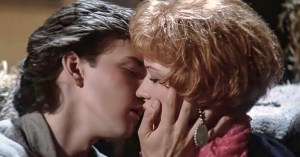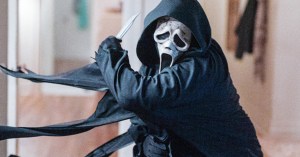Rank Anton Yelchin’s 10 Best Movies
In this week's Total Recall, we look back at the late Thoroughbreds star's best-reviewed movies.
Writer-director Cory Finley’s Thoroughbreds is one of the more acclaimed releases arriving in theaters this weekend — and it also contains the final onscreen appearance of Anton Yelchin, who passed away on June 19, 2016. We’re paying our respects by taking a fond look back at some of the brighter critical highlights from his too-brief career while asking you to rank your own favorites from his filmography, and you know what that means: it’s time for Total Recall!
1.

(Photo by A24)
Anton Yelchin was only 27 when he died in 2016, but he made a slew of films during his too-brief career — and he had an evident knack for picking terrific scripts across a broad variety of genres, ranging from romances to horror to weird comedy and beyond. Green Room, the sophomore outing from writer-director Jeremy Saulnier, falls squarely into the “and beyond” camp: an ensemble horror picture about the members of a band (including Yelchin and Alia Shawkat) trapped in a scuzzy nightclub by the ruthless owner (Patrick Stewart) after they witness a crime, it blends blood and guts and pitch-black laughs with intoxicating abandon. “Green Room is one nasty piece of work,” wrote Soren Anderson for the Seattle Times. “And I mean that in a good way.”
2. The Star Trek Franchise

(Photo by Industrial Light & Magic/Paramount Pictures)
After bottoming out with 2002’s Star Trek: Nemesis, the series entered a state of suspended animation for over half a decade — and if it hadn’t been for the reboot mania that gripped Hollywood during the early 21st century, there’s no telling how long it might have stayed there. Director J.J. Abrams righted the ship by pressing the do-over button on the franchise with 2009’s Star Trek, rounding up a new Enterprise crew led by Chris Pine as James Kirk and completed by a well-chosen ensemble that included Zachary Quinto as Spock, Zoe Saldana as Uhura, Karl Urban as Bones, Simon Pegg as Scotty, John Cho as Sulu, and — of course — Anton Yelchin as Chekov. While critics haven’t been quite as enraptured by the pair of follow-up installments that have arrived in the rebooted Trek‘s wake, they’ve all been Certified Fresh — the longest such streak in franchise history. “The actors work so well together that they reinforce the series’ central appeal,” wrote Peter Rainer for the Christian Science Monitor. “This crew is like family.”
3.

(Photo by Magnolia Pictures)
The experiments conducted by Yale psychologist Stanley Milgram explored the willingness of ordinary people to commit acts of atrocity while following orders — and unsurprisingly, their findings have been explored in countless ways through various media, from music to the screen. Writer-director Michael Almereyda added his own entry to the list with 2015’s Experimenter, starring Peter Sarsgaard as Milgram, supported by a star-studded ensemble that included Anthony Edwards, John Leguizamo, Winona Ryder, and Anton Yelchin. Perhaps destined for the arthouse, the movie didn’t make much of an impact at the box office — but it resonated strongly with critics like the Washington Post’s Stephanie Merry, who wrote that “Experimenter‘s most striking quality is the way it encourages us to think deeply, from the first frame to the last, even if it’s just to consider what on Earth an elephant is doing on screen.”
4.

(Photo by Sony Pictures Classics)
Yelchin certainly wasn’t above taking parts in mainstream movies, but he was also more than willing to seek out work in decidedly niche fare if it meant he got to work with actors and filmmakers he respected — as he did in 2014’s Only Lovers Left Alive, playing the supporting role of a sort of groupie to Adam (Tom Hiddleston), one half of the centuries-spanning love story at the heart of writer-director Jim Jarmusch’s unorthodox vampire story. While Jarmusch, Hiddleston, and co-star Tilda Swinton earned the lion’s share of the attention and praise for the well-received film, the end result was still another critically acclaimed acclaimed entry in Yelchin’s filmography; as Sharan Shetty wrote for Slate, “Rarely has Jarmusch’s style been so inherently suited to his content. Stillness and silence, the cardinal virtues of his method, have never been so pertinent as in the lives of the undead.”
5.

(Photo by Walt Disney Pictures)
If director Craig Gillespie had polled horror fans in 2011 and asked them if he really needed to remake 1985’s Fright Night, the answer probably would have been a resounding “no”; after all, the original was not only a surprise hit, it had matured into a solid favorite among scary movie lovers, and little seemed to be gained by updating the story of a horror-loving teen (William Ragsdale) who makes the awful discovery that his new neighbor (Chris Sarandon) is secretly a vampire. While it may not have been strictly necessary, the new Fright Night — starring Anton Yelchin as young Charley Brewster and Colin Farrell as the undead addition to the neighborhood — proved surprisingly potent, with Farrell and Yelchin’s charismatic performances matching Gillespie’s confident lens. “Fright has matured nicely over the quarter-century,” observed USA Today’s Scott Bowles. “While remaining sharp-tongued, the film knows its place on the teen landscape.”
6.

(Photo by Paramount Pictures)
Anyone who’s ever attempted a long-distance relationship knows they can be hell, and writer-director Drake Doremus knows that pain more intimately than most — as evidenced by Like Crazy, the winsome romantic drama he and co-writer Ben York Jones weaved out of their real-life long-distance broken hearts and turned into a starring vehicle for Anton Yelchin and Felicity Jones. When the movie opens, he lives in L.A. and she’s a visiting British exchange student, and although falling in love is easy, their permanent addresses aren’t — especially after she overstays her student visa and is exiled to the U.K., driving the couple apart long enough for him to start a new relationship with someone who doesn’t live across the Atlantic (Jennifer Lawrence). While the story’s broad contours may be familiar, Doremus and his sharp cast handle the formula with aplomb; the result is what the Washington Post’s Ann Hornaday deemed “A serious, deeply felt romance for an audience Hollywood most often bombards with raunchy sex comedies and video-game adaptations.”
7.

(Photo by IFC Films)
Is it truly emotionally feasible to have an open marriage? For most of us, it seems unlikely, but in the movies, anything is possible — at least until Anton Yelchin comes along and throws everything out of whack. That’s the lesson offered by 5 to 7, in which Yelchin plays a young writer who meets a slightly older woman (Bérénice Marlohe) with whom he strikes up a regular tryst on the understanding that her marriage allows for straying between the titular hours every day. Naturally, emotions eventually get involved, and things become wildly complicated — although not too complicated for most critics to enjoy. “It expresses a belief in love as something miraculous and transformational,” wrote the San Francisco Chronicle’s Mick LaSalle. “It says that love makes people what they are and provides the experiences that reverberate for a lifetime.”
8.

(Photo by J.R. Cooke/Samuel Goldwyn Films)
The redemptive power of music is something most of us have felt, but it can be awfully difficult to dramatize without coming across as mawkish — and Rudderless, a drama from director William H. Macy about a grieving father (Billy Crudup) who works his way through his sadness by teaching himself to play his late son’s songs and starting a band with a young man in the audience at one of his gigs (Yelchin), would seem to be at greater risk than most. Admittedly, a number of critics felt the movie wasn’t quite up to the task it set for itself, but the majority were drawn in by its sensitive handling of tricky material; as Chase Whale wrote for the Playlist, “Don’t let the title of this film fool you — Rudderless is solid.”
9.

(Photo by Ken Regan/Summit Entertainment)
In the years after his fall from public grace following several bouts of bizarre and generally offensive and/or ill-advised behavior, Mel Gibson needed a project that could help regenerate a little goodwill by taking him out of his dramatic wheelhouse and reminding audiences that he could still act — and he got one in the form of The Beaver, a directorial effort from Gibson’s friend Jodie Foster that gave the Lethal Weapon star the once-in-a-lifetime opportunity to play a guy who responds to a series of horrible personal setbacks by developing what appears to be an alternate personality channeled through a beaver puppet on his hand. It’s the kind of left-field premise you have to see to believe, especially given that Foster rounded out her cast with likable pros like Anton Yelchin (as Gibson’s embarrassed son) and Jennifer Lawrence (as the classmate he’s afraid to get too close to because of his weirdo dad). Destined for the commercial margins and dismissed as too tonally disjointed by some critics, The Beaver was nevertheless hailed as a dam fine film by the majority — including Lisa Kennedy of the Denver Post, who wrote, “The film is amusing, then melancholy, then weirdly funny, then not. It’s a quiet, measured work.”
10.

(Photo by MGM)
For film fans of a certain age, the notion of a coming-of-age movie in which Robert Downey Jr. plays the principal instead of the fast-talking protagonist may be somewhat painful. But time marches on, and if Hollywood had to offer up yet another entry in this well-trod genre, it could have done a ton worse than 2007’s Charlie Bartlett, starring Anton Yelchin as a brilliant but headstrong teen whose transfer to a new school presages all sorts of hijinks (and lessons learned) among the faculty and student body. If the end result was too familiar to find a truly receptive audience among many pundits, it was still charming enough to earn praise from critics like Variety’s Ronnie Scheib, who summarized it as the “rollicking story of a rich kid whose wildly successful bid for popularity has him playing drug-distributing shrink to an entire high school” and wrote, “Anton Yelchin and Robert Downey Jr. could fuel a chemistry lab.”








